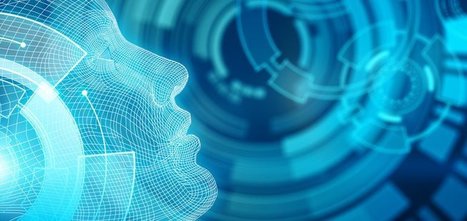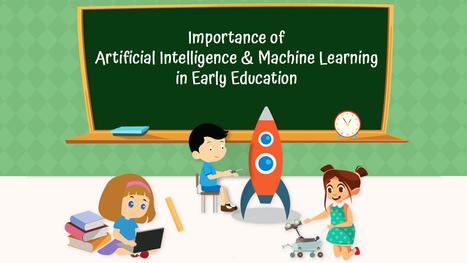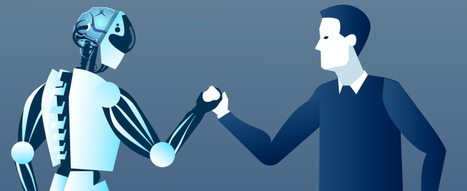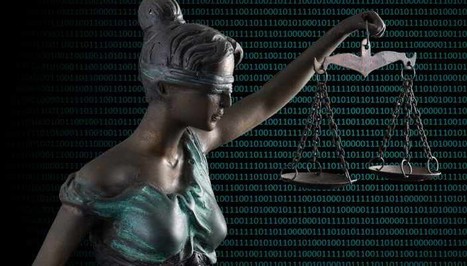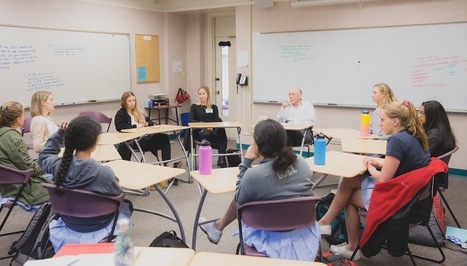 Your new post is loading...
 Your new post is loading...
Key Takeaway: The current wholesale adoption of unregulated Artificial Intelligence applications in schools poses a grave danger to democratic civil society and to individual freedom and liberty.
BOULDER, CO (MARCH 5, 2024)
Disregarding their own widely publicized appeals for regulating and slowing implementation of artificial intelligence (AI), leading tech giants like Google, Microsoft, and Meta are instead racing to evade regulation and incorporate AI into their platforms. A new NEPC policy brief, Time for a Pause: Without Effective Public Oversight, AI in Schools Will Do More Harm Than Good, warns of the dangers of unregulated AI in schools, highlighting democracy and privacy concerns. Authors Ben Williamson of the University of Edinburgh, and Alex Molnar and Faith Boninger of the University of Colorado Boulder, examine the evidence and conclude that the proliferation of AI in schools jeopardizes democratic values and personal freedoms.
Public education is a public and private good that’s essential to democratic civic life. The public must, therefore, be able to provide meaningful direction over schools through transparent democratic governance structures. Yet important discussions about AI’s potentially negative impacts on education are being overwhelmed by relentless rhetoric promoting its purported ability to positively transform teaching and learning. The result is that AI, with little public oversight, is on the verge of becoming a routine and overriding presence in schools.
Years of warnings and precedents have highlighted the risks posed by the widespread use of pre-AI digital technologies in education, which have obscured decision-making and enabled student data exploitation. Without effective public oversight, the introduction of opaque and unproven AI systems and applications will likely exacerbate these problems.
The authors explore the harms likely if lawmakers and others do not step in with carefully considered regulations. Integration of AI can degrade teacher-student relationships, corrupt curriculum with misinformation, encourage student performance bias, and lock schools into a system of expensive corporate technology. Further, they contend, AI is likely to exacerbate violations of student privacy, increase surveillance, and further reduce the transparency and accountability of educational decision-making. The authors advise that without responsible development and regulation, these opaque AI models and applications will become enmeshed in routine school processes. This will force students and teachers to become involuntary test subjects in a giant experiment in automated instruction and administration that is sure to be rife with unintended consequences and potentially negative effects. Once enmeshed, the only way to disentangle from AI would be to completely dismantle those systems.
The policy brief concludes by suggesting measures to prevent these extensive risks. Perhaps most importantly, the authors urge school leaders to pause the adoption of AI applications until policymakers have had sufficient time to thoroughly educate themselves and develop legislation and policies ensuring effective public oversight and control of its school applications. Find Time for a Pause: Without Effective Public Oversight, AI in Schools Will Do More Harm Than Good, by Ben Williamson, Alex Molnar, and Faith Boninger, at:
http://nepc.colorado.edu/publication/ai _______
Suggested Citation: Williamson, B., Molnar, A., & Boninger, F. (2024). Time for a pause: Without effective public oversight, AI in schools will do more harm than good. Boulder, CO: National Education Policy Center. Retrieved [date] from http://nepc.colorado.edu/publication/ai For original link to announcement, please see:
https://nepc.colorado.edu/publication-announcement/2024/03/ai ;
Via Roxana Marachi, PhD
Ask your students, What do you know or have you heard about ChatGPT? Have you experimented with it yourself? What did you think of it? What questions do you have?
Depending on their responses, they may need a broad introduction to the tool. If so, we recommend an episode of The Daily called “Did Artificial Intelligence Just Get Too Smart?” (Students can follow along via the transcript.)
Via Edumorfosis, Gust MEES, sidmartin
"Each of the $5.5 million-per-30-second spot commercials, which often gain as much attention as the game itself, were analyzed and assessed for effectiveness through AI and facial coding ..."
Via Leona Ungerer
Artificial intelligence is being taught by thousands of office workers around the world. It is not exactly futuristic work
Via John Evans
Four-and-a-half years after Amazon first released Alexa, its voice-activated virtual assistant, the technology is finding its footing in education
Via Peter Mellow
Field notes for busy people on self-learning software and its commercial applications.
Via John Evans
"Certain types of AI are going to transform your career in marketing and sales sooner than you think. One of these transformative technologies is voice recognition...."
Via Leona Ungerer
The creators of a revolutionary AI system that can write news stories and works of fiction – dubbed “deepfakes for text” – have taken the unusual step of not releasing their research publicly, for fear of potential misuse.
OpenAI, an nonprofit research company backed by Elon Musk, Reid Hoffman, Sam Altman, and others, says its new AI model, called GPT2 is so good and the risk of malicious use so high that it is breaking from its normal practice of releasing the full research to the public in order to allow more time to discuss the ramifications of the technological breakthrough.
Via John Evans
The company's artificial intelligence technology outperformed a human on a benchmark reading comprehension test.. Maine news, sports, politics, election results, and obituaries from the Bangor Daily News.
Via Benny Boonen
"The blockchain and artificial intelligence are among several technologies and practices poised to impact higher ed, according to experts at Educause ..."
Via Leona Ungerer
|
In November of 2022, a Silicon Valley company launched an invention that could complete students’ homework for them. Available only to subscribers at first, by the spring of 2023 OpenAI’s ChatGPT-3.5 was available to millions of students. As of January 2023, anyone with . . .
Via Tom D'Amico (@TDOttawa)
The recent revelations that ChatGPT can be used by students to write convincing essays and explanations is a frightening prospect for any teacher. With many exams and assignments now carried out online, there is ample opportunity for using AI writers.
While ChatGPT might seem at first glimpse like a gift to students, it is actually a sign that they need to up their game. Students will need to increase their synthesis of evidence, demonstrate critical thinking and show creativity just to stay ahead of AI during their studies and future employment.
Via Edumorfosis, Gust MEES, sidmartin
"Artificial intelligence isn’t coming for your job, but it will be your new coworker. Here’s how to get along ..."
Via Leona Ungerer
"Learn the importance children involving themselves with AI and ML as the fastest-growing technology to have impacted society and technology ..."
Via Leona Ungerer
A large public research university figured out how to tap the power of artificial intelligence and human intelligence to produce impressive gains in s
Via Peter Mellow, LGA
For most design projects and presentations, you need quality portraits of people. Designers often spend a lot of time trying to find images that are free, diverse, and legal to use. To make life easier, Icons8 has come up with a brilliant free resource called Generated Photos – a diverse library of 100,000 realistic faces […]
Via John Evans
Henry Kronk | IBL News: "Professor Emeritus Ray Schroder finds it difficult to stop working. As the Associate Vice Chancellor for Online Learning at the University of Illinois Springfield and the founding director of the National Council for Online Education at the University Professional and Continuing Education Association (UPCEA), he has a lot on his plate."
Bias is a fundamental human characteristic. We are all biased, by our very nature, and every day we make countless decisions based on our gut feelings. We all have preconceived ideas, prejudices, and opinions. And that is fine, as long as we recognize it and take responsibility for it.
The fundamental promise of AI, besides the dramatic increase of data processing power and business efficiency, is to help reduce the conscious or unconscious bias of human decisions. At the end of the day, this is what we expect from algorithms, isn’t it? Objectivity, mathematical detachment rather than fuzzy emotions, fact-based rather than instinctive decisions. Algorithms are supposed to alert people to their cognitive blind spots, so they can make more accurate, unbiased decisions.
At least that’s the theory…
Via John Evans
You have probably never heard of GPT-2 but it is a breakthrough in AI that has astonishing implications for us all, especially in learning. GPT-2 is an AI model that can predict the next word from a given piece of text. Doesn't sound like much but it's odd that an OpenAI, an open-source site, would close access to their software. In practice, this means it is a powerful model for:
Summarising
Comprehension
Question answering
Translation
Via Elizabeth E Charles
Shouldn’t young people know about the most important change force that will influence their lives and livelihoods?
We think so. That’s why every high school should offer a course on artificial intelligence (AI). Or, better yet, incorporate a set of competencies into graduation requirements that ensure that every young person understands the technology drivers and the implications for the economy and society.
The prevalence of AI has increased dramatically in the last few years. Most people are unaware that AI is a key technology behind personal assistants (Alexa, Siri, Google), autonomous vehicles, predictive analytics (Amazon and Netflix recommendations) and medical diagnostics just to name a few.
Young people may be digital natives but most of them are digitally naive. They know little to nothing about how technology works. And few of them appreciate that smart machines are reshaping the employment landscape and challenging social norms.
Via John Evans
Artificial intelligence (AI) is reshaping life and livelihoods. It’s curating every screen; making or influencing decisions about hiring, loans, and jail sentences; and aggregating wealth and opportunity at a staggering pace.
AI, particularly machine learning (ML), and related exponential technologies (ET) are quickly augmenting many tasks at home and work. They will increasingly displace jobs while creating new entrepreneurial opportunities. They will swamp communities with complex issues and a combination of predictable and unanticipated consequences.
AI is not just a tech issue, it’s a social studies issue. Teaching youth to code may be part of the response, but even more important is asking them to consider issues of the changing civic and employment landscape.
“The aim of social studies is the promotion of civic competence,” says the National Council for the Social Studies. Their standards are built around 10 themes that are being shaped by AI and ET.
Via John Evans
|



 Your new post is loading...
Your new post is loading...
















